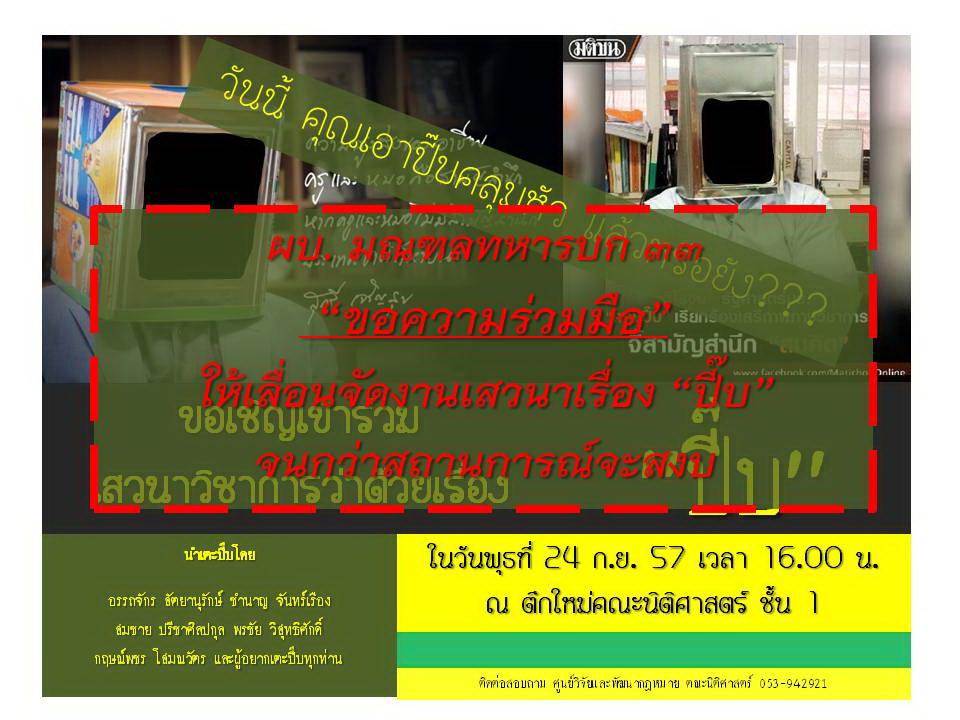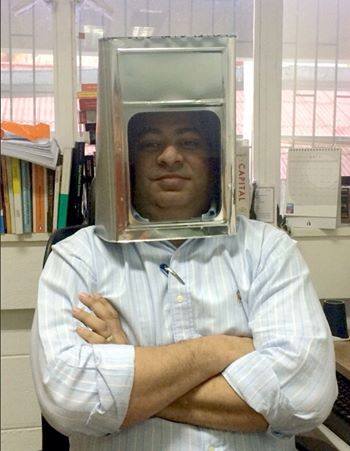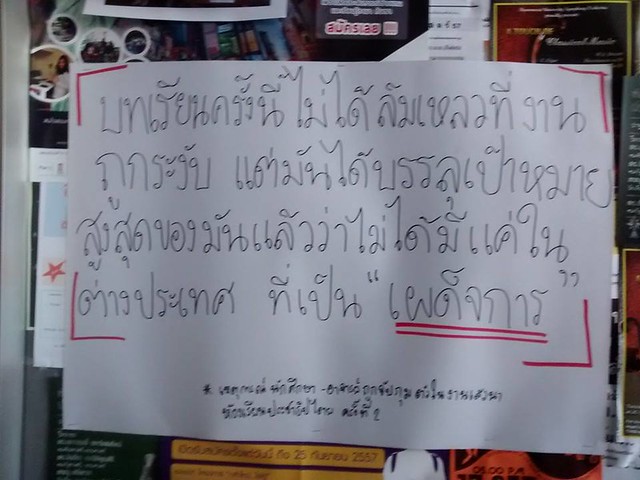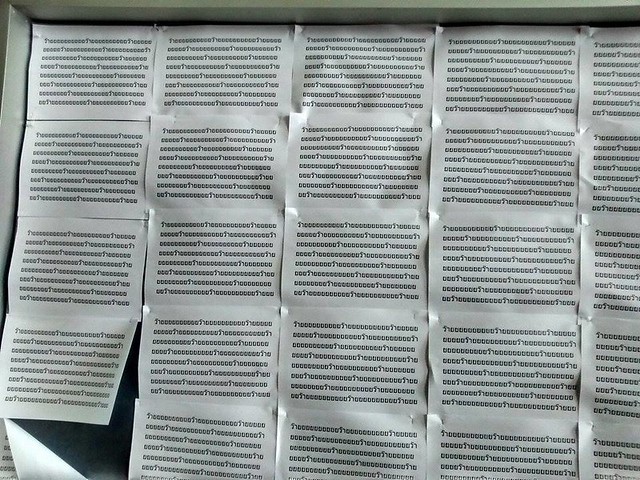This story was published on Prachatai in Thai on Monday and the original can be read
here. Today (Tuesday) is both the six-year anniversary of the arrest of Daranee Charnchoengsilpakul, aka Da Torpedo, and the two-month anniversary of the coup by the junta's National Council for Peace and Order (NCPO). Daranee is currently serving a fifteen-year sentence for three alleged violations of Article 112. During the past six years, Daranee has experienced consistent obstacles in accessing justice. She still lives in pain with degenerative jaw disease. In late 2013, she decided to cease her appeal to the Supreme Court and request a royal pardon, whose result she is currently awaiting.
Daranee originally wanted to take her case to the end point of the Supreme Court so it would be a case recorded in history for later generations to study. Even without a decision by the Supreme Court, her case is a historic one, for a variety reasons, some which can be uttered and others which cannot. The final question that Metta Wongwat conveys from Daranee is one appropriate for both the anniversary of her imprisonment and the anniversary of the coup: “The conflict is proof of the strength of the level of democracy [in Thailand]. There is nothing strange about the conflicts among the people over thinking. But how will we manage the conflict so that we are able to live together?”
Several clarifying additions for English-language readers have been put in [ ] in the text.
-------------------------
22 July 2014 is the six-year anniversary of the imprisonment of Daranee Charnchoengsilpakul, or ‘Da Torpedo,’ at the Central Women’s Prison.
She was the first political prisoner [of this era] to be imprisoned under Article 112.
Retracing a memory: the case of Da Torpedo
After General Sonthi Boonyaratglin fomented the 2006 coup, scattered opposition groups were born. These were small, little groups which existed before the establishment of the Democratic Alliance Against Dictatorship (DAAD), which then expanded to become the United Front of Democracy Against Dictatorship (UDD) of today. At that time, different groups of people made speeches against the coup at Sanam Luang. The majority were those who admired the Thai Rak Thai Party, mixed together with some progressives. They gathered in small groups and the listeners numbered not many tens of people. Daranee was a star of the ‘Hyde Park’ at Sanam Luang, and her fiery and straightforward speech earned her the nickname ‘Da Torpedo.’
All of this occurred in the context of the existence of significant divisions among how people in society thought, particularly about the institution of the monarchy, which was omnipresent and used widely as a political tool. This was the case to the degree that the junta was able to use the institution of the monarchy to gain legitimacy in fomenting the 2006 coup, which then caused the role of the institution of the monarchy [in society and politics] to be criticized even more severely.
In 2007, big news was made when a vendor from Pak Klong Market threw feces in Daranee’s face. The vendor claimed that she did so because she could not bear Daranee’s speech about General Prem Tinsulanond.
The story of Daranee’s speech on a small stage on Sanam Luang on the evening of 20 July 2008 became well-known in society as a result of the actions of Sonthi Limthongkul. He recorded her
speech and then read it on the Makkawan stage [of the People’s Alliance for Democracy (PAD)], which was also live streamed on both cable television and online [the Manager/ASTV website]. During this period, the PAD was demonstrating to call for the ouster of the government of Samak Sundaravej of the People’s Power Party.
“This bitch should be put in prison, and should be killed as well. I speak from my soul, I swear, don’t let me meet with her. I will beat the bitch until she is completely flattened. She is the most vile, brothers and sisters. Don’t listen to her, she has defamed beyond defamation. She has gone ten times beyond the defamation committed by Jakrapob.”
“I have never seen anyone more wicked than this damn woman, the mother of all the damned.”
Sonthi hinted that he was referring to Daranee before he read parts of her speech word for word on the stage.
The next day, the Army sent an urgent letter to the Metropolitan Police Commissioner about prosecuting those who commit offenses against the king. The Army asked the Metropolitan Police to examine the speech of Ms. Daranee. If it was found that there was wrongdoing, the Metropolitan Police were to proceed in accordance with the law.
The next day, the court issued a warrant for her arrest. The police arrested Daranee at her apartment and she has been in prison since then up until today.
She was sentenced by the Appeal Court to 15 years in prison for 3 counts of wrongdoing (she spoke on the small stage three times). The case is now finished and those who are interested can read the decision of the Court of First Instance, including what she said on the stage, in Fa Diew Kan, which printed the entire decision in the issue on “New Information,” Volume 7, Issue 3, in 2009.
(While she was imprisoned, she was also found guilty of defaming Sonthi Limthongkul. The Court ordered her to pay a fine of 50,000 baht. In addition, she was found guilty of defaming General Saprang Kalyanamitr and fined 50,000 baht.)
Sonthi Limthongkul was charged with violating Article 112 for repeating her speech from Sanam Luang on the Makkawan Stage; the Court of First Instance threw out the case as they viewed that the defendant was acting with the intention to bring a case against Daranee and this was not within the scope of violation of Article 112. Subsequently, the Appeal Court overturned this decision and sentenced him to 2 years in prison, but he was granted bail. The Appeal Court offered the opinion that, “It was not necessary for the defendant to broadcast and repeat the content [of Daranee’s speech] in public. This is because some Thais did not know the content of Ms. Daranee’s speech, and came to learn about it from the defendant’s speech. This resulted in criticism that affected the institution [of the monarchy]. This was an action that was not sufficiently circumspect.”=
The genealogy of a thought criminal
Daranee completed her bachelor’s degree at Ramkhamhaeng University. She studied for a master’s degree at Thammasat University, but did not complete because she had a disagreement with a professor, and so she continued her graduate study at Krirk University. Her path always led her to choose to study political science without deviation.
Her older brother said that his younger sister was a bookworm. She had to rent two rooms: one to live in and one for her books.
“I like to buy and read books. Sometimes I bought them and put them away for later. I had about a thousand books. But now I do not know where they are any longer,” Daranee said after 6 years in prison.
“Before, I liked to read run-of-the-mill academic books, about politics, history, sociology. But in the later periods, before I went on the stage, I read the work of Supot Dantrakul. I have not read all of his books, only some of them,” Da said.
During her time in the Women’s’ Prison, Daranee has gone from a hardcore political to a person who does not know the country’s news. The channels through which to learn about what is taking place are through hearing news from new prisoners or chatting with the wardens. The Women’s Prison has a rule which forbids prisoners from watching the news. They are only permitted to watch Korean and Thai films. Daranee said that once, many years ago, she was punished and prevented from visiting with her relatives for a week because she had secretly tuned to a news channel on the prison television.
At the same time, the books and magazines in the prison are limited. They are women’s magazines that are years out-of-date. This is what she tells those who come to visit. This lack of books is in addition to the below-standard quality of life of the women prisoners, which results from crowding, problems of organization, overly-strict rules and regulations, and the problems of budget shortfalls.
An account of systemic problems is often heard from the mouth of this student of politics. This is not only a problem of the prison, but extends to the political problems of the country as well.
During the past 6 years there are many things that have changed and many that have not.
Things that have not changed
First, the foundation of her thinking has not changed from the first year that I went to visit her until the sixth year when we once again had the chance to speak for a short, 15-minute period. She still maintains that inequality and the wide gaps between classes are the most significant problems of Thai society. This caused her to be impressed with the policies of the Thai Rak Thai party, since the things that are called ‘populism’ had positive effects that reached the lives of the lower-class people directly. Even though she was very disappointed with this party’s inability to protect or assist the people who rose up to demand what she called ‘democracy,’ no matter. She thinks that economic policy is very important, and must be emphasized for the people at the grassroots to be able to come along in the world.
“When people are economically equal, the effect will be to make them more politically equal,” Da said.
Significantly, she often expressed concern about the ability of Thailand to compete when the ASEAN Economic Community was opened. She worried that Thailand lagged behind its neighbors.
One visitor joked with Da that, “Perhaps the issue of the AEC does not matter. It’s better to tackle our urgent issues first.”
Second, the condition of her inflamed jaw and the adhesions between the top and bottom portions have not changed. At present she still suffers with this disease. She cannot fully open her mouth when she eats or speaks. She said that she did not dare to undergo surgery in the prison as it is a major surgery. The recovery takes a month. Within the prison system, she would be cared for during recovery by her fellow prisoners. But as she has argued with many big shot prisoners, she does not have confidence in this process.
Once she joked that when she was in pain, she took paracetamol, and perhaps before she is released and has the surgery she will end up with liver disease.
Things that have changed
First, from the time that Daranee fought the case in the Court of First Instance, she said that she would fight the case until it reached it’s end in the Supreme Court. This is because she wanted hers to be a historic case that the next generations can learn from by reading the Supreme Court decision. But it seems that her hope has been collapsed. After the long fight in the case and the upholding of the 15-year sentence by the Appeal Court, she no longer places hope in fighting the case. The people who came to visit her seemed to evaporate until there were nearly none in the later years. Plus her brother became unable to continue visiting her every week once fate brought him to be forced to live in a prison cell as well.
“Now, there is a new regulation. Prisoners are to write the names of 10 persons who come visit them. Anyone in addition to this cannot come visit.” She appealed this new regulation which may have caused her to meet with even fewer people.
Daranee said that she cannot remember when she withdrew her Supreme Court appeal, but it resulted in her case ending with the Appeal Court decision. From that point, she requested an individual royal pardon at the end of 2013. She learned that the matter was in the Office of His Majesty’s Principal Private Secretary in January of this year, and now can perhaps only await his mercy.
The second thing that changed is her dream that she would enter politics. In prior years, she had said that she would do so and her role in Parliament would be to push for policies to urgently assist lower-class people. But at present her dream after she is released is to write a book about her life in prison. She plans to use one part of the proceeds to establish a hotline center to help prisoners who do not receive justice in their cases, such as those who do not have lawyers, have problems with documents, etc.
No one has asked her yet when her political dream slipped away.
Daranee at a court hearing (file photo)
A new librarian in the prison
However, Daranee has had some good news in the 6 years she has been in prison. She was appointed the librarian to look after a small library in the first (receiving) zone of prison.
She wants to inform people that anyone who wants to donate books can do so. Any kind of books except political books can be donated. It is best if two copies can be donated as if one copy is donated it will be sent to the library in the zone for people who are imprisoned on grave cases.
In one period, Daranee talked about the good books available in prison and noted that she had read a book of interviews with academics collected on the occasion of the 100 year anniversary of Pridi Banomyong (Pridi is a name that she often talked about when she was first in the prison). She mentioned the comments of Ajarn Chantana Banpasirichote Wankaew, with whom she was impressed.
“The conflict is proof of the strength of the level of democracy [in Thailand]. There is nothing strange about the conflicts among the people over thinking. But how will we manage the conflict so that we are able to live together?” This question may be one that she wishes to leave with society on the occasion of her sixth year in prison.
Timeline of Daranee Charnchoengsilpakul’s Case
(Compiled from the Freedom of Information Documentation Centre of iLaw)
22 July 2008: Arrested at her apartment. Bail is denied.
25 July 2008: Suthachai Yimprasert, lecturer in the Faculty of Arts at Chulalongkorn University, submitted a petition for her bail. The officials at the Appeal Court accepted the petition.
1 August 2008: The Appeal Court dismissed the petition for temporary release. After examination, they offered the opinion that this offense possessed a high penalty, was a serious crime, and affected the hearts of the people. If the accused was released, they worried that she would commit additional crimes.
9 October 2008: The Court accepted the case from the prosecutor in the Office of the Attorney General (Office of the Special Prosecutor for Criminal Cases, Area 7). The case was assigned Black Case No. Or. 3959/2551.
16 October 2008: Suthachai submitted another petition for temporary release. The Court of First Instance and the Appeal Court dismissed the petition on the same day.
1 December 2008: The Criminal Court met to examine the evidence and question the defendant. They ruled to move the meeting until 15 December as the defendant had just appointed a lawyer at the end of November. Prawais Praphanukul, her lawyer, submitted a petition for temporary release. The Court of First Instance dismissed the petition and claimed that there was no reason to change the initial order.
4 December 2008: Daranee’s lawyer submitted an appeal of the order of the Court of First Instance that dismissed the request for temporary release. He argued that the order to deny temporary release per Article 108/1 [of the Criminal Procedure Code] must be a case in which an accused/defendant will flee or interfere with evidence, or create an otherwise dangerous situation; or the petitioner must be an untrustworthy person who would cause damage to the investigation or carrying out of the case. In this case it did not appear that the defendant would be able to interfere with the evidence because the officials had already investigated and proceeded with the case. Regarding flight, this was only a presumption without any presentation of credible cause that the defendant would flee. The Court of First Instance relied on facts outside the case file in its analysis and the ruling was in conflict with Paragraphs 2 and 3 of Article 39 of the 2007 Constitution because this case is still at the level of examination. Whether or not the defendant has committed the crimes as charged was still unconfirmed. Therefore, she must be held to be innocent. Subsequently, in mid-December, the Appeal Court upheld the original logic of the Court of First Instance. In other words, permission for temporary release was denied and the petition was dismissed.
15 December 2008: The Court set the dates of witness testimony by the plaintiff witnesses for 23-25 June 2009 and the defense witnesses for 26-30 June 2009.
23 June 2009: Judge Phromas Phusaeng of the Criminal Court ordered for this case to be examined in secret per Article 177 of the Criminal Procedure Code.
24 June 2009: Daranee released a statement to the ‘Media and brothers and sisters who love justice.’ In the statement she noted that she became a lèse majesté defendant on 22 July 2008 and had been detained for a year without release up until the present, while many others facing the same charge were granted bail.
In the statement, Daranee raised the question about the examination of her case, which the court had ordered to be held in secret without allowing any media or people to come to listen. How come these guidelines were not used in other cases “of the same charge and type,” or other cases of lèse majesté? Her view was that the secret examination of her case was an obfuscation of the truth, the prevention of the people from gaining knowledge, and was a complete destruction of the principles of justice.
25 June 2009: In Room 904 of the Criminal Court, her lawyer submitted a petition to the court to temporarily halt the examination of the case per Article 211 of the Constitution. He noted that the Criminal Court’s order to examine the case in secret and to prevent ordinary people from coming to listen was in conflict with Article 40(2) of the 2007 Constitution, which stipulates basic rights in the process of examination in the court, and in conflict with Article 29 of the Constitution, which stipulates the limitations that can be placed on an individual’s rights and liberties.
The defendant’s view was that Article 177 of the Criminal Procedure Code on which the Court relied on to order the secret examination of the case was in conflict with the Constitution. The Constitutional Court had not yet offered analysis on this matter. Therefore, the defendant asked the Court to forward these views to the Constitutional Court for analysis. Per Article 211 of the Constitution, they asked the Criminal Court to wait to decide the case until the Constitutional Court made a comment.
Subsequently that day, the Court examined and dismissed the petition of the defendant. They noted that secret examination was not in conflict with Article 211 of the Constitution, as the defendant had a lawyer and was able to submit any and all evidence to the Court. The examination of the case would therefore continue.
However, after the examination of the plaintiff witnesses, Daranee’s lawyer requested that the Court move the examination of defense witnesses from 26 and 30 June as originally scheduled to 28 July and 5 August. The Court agreed.
28 August 2009: The Court of First Instance found the defendant guilty as charged of committing several different counts of wrongdoing. She was punished for each count. She was sentenced to 6 years in prison for each of 3 counts, for a total of a prison sentence of 18 years.
The defendant appealed and asked the Court to send her petition to the Constitutional Court on the basis that there was not yet a comment by the Constitutional Court on whether or not Article 177 of the Criminal Procedure Code was in conflict with Articles 29 and 40 of the 2007 Constitution. The Court of First Instance dismissed the petition.
9 February 2011: The Appeal Court ruled that when they examined the appeal they found that the defendant’s petition had never been sent to the Constitutional Court. Therefore, it was correct to send this matter to the Constitutional Court. And, as the Court of First Instance did not send the petition to the Constitutional Court before they issued the decision, the Appeal Court overturned the sentence of 18 years. They sent the petition to the Constitutional Court and when the Constitutional Court had examined the petition, depending on the circumstances, the Court of First Instance would be asked to rule on the case again.
17 October 2011: The Constitutional Court commented that Article 177 of the Criminal Procedure Code was not in conflict with Articles 29 and 40(2) of the 2007 Constitution. The Court of First Instance could therefore make a new decision in this case.
15 December 2011: The Criminal Court ruled that the defendant committed several separate violations of Article 112. She was punished for each count, for a total of 3 counts, and sentenced to 5 years in prison for each count, for a total of 15 years in prison (The reason for the reduction from the initial
sentence of 18 years was not given).
16 March 2012: The Appeal Court dismissed the petition for temporary release, which was submitted along with 1.44 million baht in cash from the Department of Rights and Liberties Protection in the Ministry of Justice.
12 June 2013: The Appeal Court met to read the decision upholding the decision of the Court of First Instance. They did not read the entire decision, but only the order of punishment. They noted that, “ …still believe that the defendant defamed and insulted the king, and caused his dignity to be tarnished. Harsh punishment is appropriate in order to not turn her into a model [for others]. The appeal of the defendant is not tenable. The sentence of 15 years of the Court of First Instance stands.”
9 September 2013: The deadline to request an extension to submit an appeal to the Supreme Court passed. The defendant did not submit an appeal of the decision of the Appeal Court. The case is therefore at its end. No further appeals can be made.
Translated by Tyrell Haberkorn.








